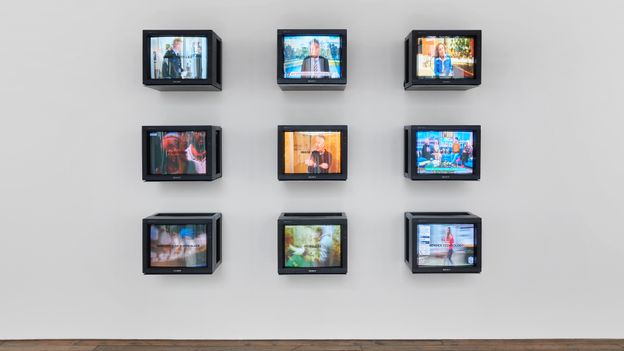
The effects of mass media and communication is an area that has been extensively studied by human behavioral experts. Dr Sharon Coen is a media psychologist and senior lecturer at Manchester’s University of Salford. “I think art, paradoxically, has a better chance than I do in getting the message across,” she tells BBC Culture. “If I say it, it will sound like doom. First of all, artists can take a non-traditional, non-scientific approach, which can help us to understand things in different ways. An art piece hits in the heart.”
While Coen recognises the negative effects that mass media can have, she feels positive about the human ability to recognise the dangers. “There are a lot of alarmist attitudes, feelings of ‘Oh my God, we’re screwed’,” she says. “Actually, the more I talk to people and observe my surroundings, I realise that we are very strategic. With ‘doom scrolling’, some people get sucked in and they spend hours and hours looking at terrible stuff online. But guess what, how did we learn about doom scrolling? Because people realised they were doing it and said ‘Oh, this isn’t good.’ So while it is a problem, I don’t think we should underestimate ourselves.”
Coen traces the fear of collective cognitive decline to long before the internet was formed, and even before the visual overload of television. “A lot of my peers have a tendency to blame the internet and say it’s the origin of all our problems,” she says. “I keep telling them, more than 2,000 years ago Socrates hated writing. Why? Because he was saying we were going to become stupid and not be able to remember anything. He thought our cognitive functioning would change. But in writing we save mental space that we would use in trying to remember everything, and we can use that for other things. It’s always a balance.”
Many of today’s artists have one eye on the trailblazing names who came before them, and the other on future developments that loom on the horizon. “I loathe the idea of the metaverse,” says Holder, “but it seems as if this is the way that the mega-cyber corps want to take us, creating a virtual layer of reality, a simulation of life. Grandiose claims are being made about it. That it will help improve mental health, reduce crime rates and save the planet, but I’m sceptical, and think that the opposite will also be true. I think we should give up on the idea of trying to create a copy of the world in digital form, life is far too complex, it can’t be simulated.”